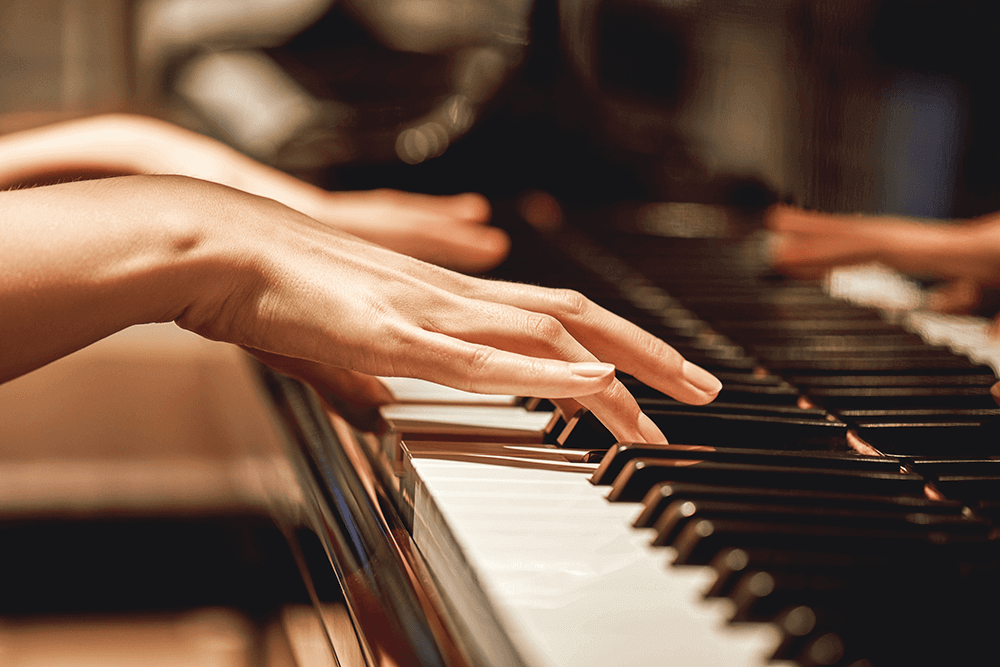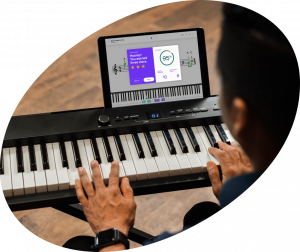Playing the piano can be a lifelong journey — a journey filled with so much joy. Learning to play really well can take a little bit of time (and some piano lessons), but progress is ensured as long as you have the desire to learn, and the willingness to invest some time practicing.
As you progress, improving your piano playing technique will go a long way in not only helping you learn songs more quickly, but also in helping you make the piano sound as beautiful as you hope and intend it to sound. In this blog post, we’ll share some tips on how to improve your piano playing technique.
Proper posture
The first step to improving your piano playing technique is to make sure you have proper posture. Sit up straight with your feet flat on the ground, and your arms and hands relaxed. Avoid slouching or hunching over the piano, as this can lead to tension and pain in your back, neck, and shoulders. Remember to keep your wrists level with the keyboard and your elbows at your sides.
Finger placement
Next, you want to make sure you are using proper finger placement when playing the piano. Your fingers should be curved and relaxed, with the tips of your fingers making contact with the keys. Make sure you are using the correct finger for each key, and avoid using your thumbs too much.
Practice scales
Practicing scales is a great way to improve your piano playing technique. Scales help you develop finger strength and agility, as well as improve your hand coordination. Start with simple scales such as C major, and gradually work your way up to more complex scales like B-flat minor.
Work on finger independence
Finger independence is crucial to playing the piano well. You need to be able to move each finger independently, without affecting the other fingers. One way to improve finger independence is to practice Hanon exercises. Hanon exercises are a series of finger exercises that help develop finger independence, strength, and speed.
Practice slowly
One of the most important things you can do to improve your piano playing technique is to practice slowly. Take your time and focus on playing each note accurately and with the correct finger placement. Slow practice helps you develop muscle memory and ensures that you are playing with the proper technique.
Use a metronome
Using a metronome is another great way to improve your piano playing technique. A metronome helps you develop a sense of timing and rhythm, which is essential to playing the piano well. Start at a slow tempo and gradually increase the speed as you improve.
Listen to yourself
When practicing, it’s important to listen to yourself play. Pay attention to the sound you are producing and make adjustments as needed. If you notice any mistakes or inconsistencies, slow down and work on that section until you can play it accurately and smoothly.
Practice with dynamics
Dynamics are an essential part of playing the piano. Dynamics refer to the volume and intensity of the music. Make sure you practice playing with dynamics, using a range of soft and loud sounds. This will help you develop control and expression in your playing.
Use pedals wisely
The pedals are an important part of piano playing, but they should be used wisely. The sustain pedal is the most commonly used pedal and should be used to create a smoother sound, but not to cover up mistakes. The soft pedal should be used to create a softer sound, but not to make up for lack of dynamics.
Take breaks
Finally, it’s important to take breaks when practicing the piano. Playing for long periods of time can cause fatigue and tension in your hands and arms. Take breaks every 20-30 minutes to stretch your hands and relax your muscles.
In conclusion, improving your piano playing technique requires time and dedication. By following these tips and practicing regularly, you can improve your posture, finger placement, finger independence, timing, and expression. Remember to take your time, practice slowly, and listen to yourself play. With patience and perseverance, you can become a skilled pianist.

